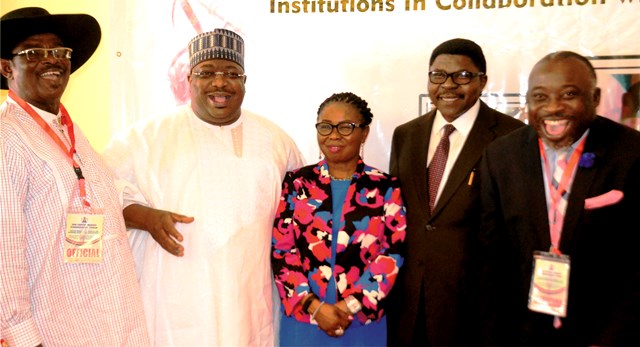Business
‘FG Needs More Borrowing To Fund Infrastructure’

The Federal Government is expected to take more loans if its plan to fund infrastructure is to be realised, says a senior analyst at Agusto & Co, Mr Jimi Ogbobine.
Ogbobine said this at a training for financial journalists during the Finance Correspondents Association of Nigeria’s annual workshop in Lagos yesterday. He said government was expected to deploy about N1.6 trillion to fund infrastructure this year.
He said that the training, entitled, “Analysis of the Macroeconomic Environment’, organised by Rand Merchant Bank, was meant to deepen journalists’ knowledge of the economy and financial industry developments.
Ogbobine said the bulk of financing for infrastructure would come from borrowing with a larger share being domestic debts.
He also said funding the capital budget would require higher than planned borrowing with adverse implications for interest rates and interest costs for the economy.
“The Federal Government borrowing to fund infrastructure is likely to be between N1.2 and N1.6 trillion.
“The implementation is unlikely to start before the second quarter and revenue is likely to be lower than planned.
“Actual funding from asset restructuring, recoveries and others may be substantially lower than the planned level of N2 trillion.
“Therefore, fully funding the capital budget will mean higher than planned borrowing with adverse implications for interest rates and interest costs,” he said. He added that obligatory spending of the federal government was still more than 100 per cent of revenues, hence, there was no free cash flow for investment in infrastructure.
“Every kobo of infrastructure spending is financed by debt constraints ability to fully fund budgeted amounts.
“Debt as percentage of revenue is significantly higher than the median, of 200 per cent, for countries in Middle East & Africa.
“Federal Government plans to partly finance 2018 capital expenditure with proceeds of asset sales,” he said. Speaking on inflation, he said a hyper-inflationary environment was one where prices double at least every three years.
“This means inflation rate of about 25 per cent per annum.
“In such environments, investors hold savings in low inflation currencies like dollars, Pounds Sterling and Euros.
“Also, business persons price products, particularly those with a high import content in these low inflation currencies, usually the dollar.
“In effect, such environments are ‘dual currency environments’.
“Real Gross Domestic Product per capita should grow in 2018, making it easier for businessmen to access forex to fund their operations. Therefore, most businesses should see top line and profit growths while unemployment rate will fall but the level will remain high,” he said.
The analyst said actual deficit might be lower than planned deficit largely because of a low implementation of the capital budget.
Ogbobine said that based on the long-term inflation difference, the naira-dollar exchange rate should close 2018 at about N420/1 in the Investors & Exporters’ FX Window.
He, however, predicted that should oil revenues increase, the CBN might try to keep rates in the market as close as possible to the current levels.
Transport
Nigeria Rates 7th For Visa Application To France —–Schengen Visa

Transport
West Zone Aviation: Adibade Olaleye Sets For NANTA President

Business
Sugar Tax ‘ll Threaten Manufacturing Sector, Says CPPE

In a statement, the Chief Executive Officer, CPPE, Muda Yusuf, said while public health concerns such as diabetes and cardiovascular diseases deserve attention, imposing an additional sugar-specific tax was economically risky and poorly suited to Nigeria’s current realities of high inflation, weak consumer purchasing power and rising production costs.
According to him, manufacturers in the non-alcoholic beverage segment are already facing heavy fiscal and cost pressures.
“The proposition of a sugar-specific tax is misplaced, economically risky, and weakly supported by empirical evidence, especially when viewed against Nigeria’s prevailing structural and macroeconomic realities.
The CPPE boss noted that retail prices of many non-alcoholic beverages have risen by about 50 per cent over the past two years, even without the introduction of new taxes, further squeezing consumers.
Yusuf further expressed reservation on the effectiveness of sugar taxes in addressing the root causes of non-communicable diseases in Nigeria.
-

 Niger Delta2 days ago
Niger Delta2 days agoPDP Declares Edo Airline’s Plan As Misplaced Priority
-

 News4 days ago
News4 days agoDon Lauds RSG, NECA On Job Fair
-

 Sports2 days ago
Sports2 days agoSimba open Nwabali talks
-

 Nation2 days ago
Nation2 days agoHoS Hails Fubara Over Provision of Accommodation for Permanent Secretaries
-
Niger Delta2 days ago
Stakeholders Task INC Aspirants On Dev … As ELECO Promises Transparent, Credible Polls
-
Niger Delta2 days ago
Students Protest Non-indigene Appointment As Rector in C’River
-

 Oil & Energy2 days ago
Oil & Energy2 days agoNUPRC Unveils Three-pillar Transformative Vision, Pledges Efficiency, Partnership
-
Rivers2 days ago
Fubara Restates Continued Support For NYSC In Rivers

